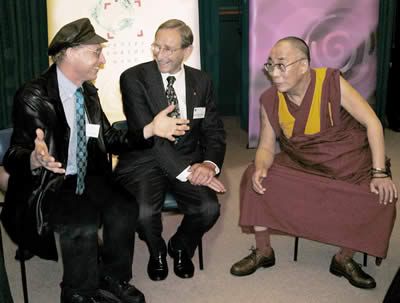
Once in a long while, I describe myself in a way that reveals an aspect of my personality or ideology that I had not before acknowledged. This past Saturday, I explained my fascination with biology (and in a more general sense, all the sciences) to a friend as we viewed the excellent "Imagined Worlds" exhibition, at AXA Gallery (more on this terrific show in an upcoming post).
"If not for the painting monkey on my back," I said. "I'd be very happy to work as a field biologist. I think my love of the sciences is, in large part, rooted in a lack of faith in objective scientific truth." Wait! What? I've never framed the idea in that way, but that's exactly right! My love of science is that of the skeptic; my faith is provisional. How bizarre!?
I'm sometimes mischaracterized, even by friends, as a dogmatic champion of science over all other truths or cosmologies. I believe they label me thus for three reasons.
1) I reject the primitive notions of an interventionist sky-god and deny the singular "truth" claims of any religion.
2) I am particularly excited by evolutionary theory.
3) I am a stickler for taxonomic nomenclature.
If considering only these three qualities, I, too, might assume that we're talking about a hardcore bio geek, an individual unwilling to consider "alternative" explanations or allow magic into his or her world view. But I have other interests that provide me counterpoise. Obviously, the visual arts are very important to me, but theology, philosophy, and ethics are among my favorite subjects.
Stacked on my nightstand this month are the following books: The Larousse Encyclopedia of Myth; Bulfinch's Mythology; John Ruskin's On Art and Life; C.S. Lewis's The Discarded Image, an exploration of medieval cosmological transitions; Ernst Mayr's What Evolution Is; and Frans De Waal's Our Inner Ape. As I see it, these books on mythology, aesthetics, theology, history, and evolutionary inheritance are all intimately related. A back-and-forth reading of such texts allows me to cobble together my own cosmology.
For example, I accept that the fundamental elements produced by the Big Bang were hydrogen and helium, but I also conceive of the two primordial elements as Erebus and Nox, the Greek gods begotten by Father Chaos. When these two gods mated, Nox gave birth to a son named Aether, among other offspring. Aether is the personification of the heavens, of the "upper sky," and is therefore synonymous with the celestial elements that formed in the swirl of early space-time. Similarly, I embrace the mystical Jewish conception of the universe's origins, the creation of "Without End" (Ein Sof) from "Nothing" (Ayin, or the cosmic seed), both states of a piece with G-d's supreme body.
Given my penchant for hybrid science-myth cosmologies, I was pleased to read this short statement by Tenzin Gyatso, the 14th and current Dalai Lama, in The New York Times. I recommend reading the whole piece, but I've included some highlights below.
"If science proves some belief of Buddhism wrong, then Buddhism will have to change. In my view, science and Buddhism share a search for the truth and for understanding reality. By learning from science about aspects of reality where its understanding may be more advanced, I believe that Buddhism enriches its own world view.Thank goodness for the Dalai Lama's common sense! How I wish the pious folks in Vatican City would issue a statement such as this. And what of Judaism's Orthodox Union? The conservative Muslim clerics? Where are their voices?
[...] While I agree that certain religious concepts conflict with scientific facts and principles, I also feel that people from both worlds can have an intelligent discussion, one that has the power ultimately to generate a deeper understanding of challenges we face together in our interconnected world.
[...] By invoking fundamental ethical principles, I am not advocating a fusion of religious ethics and scientific inquiry. Rather, I am speaking of what I call "secular ethics," which embrace the principles we share as human beings: compassion, tolerance, consideration of others, the responsible use of knowledge and power. These principles transcend the barriers between religious believers and nonbelievers; they belong not to one faith, but to all faiths."
Surprisingly, I see our nation's evangelical Christians offering some signs of hope. Richard Cizik, Vice President of the National Association of Evangelicals, can strive for some forward progress in the grey realm where science and theology overlap, even though groups such as the NAE usually worry me.
Photo credit: ripped from Centre For The Mind website

No comments:
Post a Comment